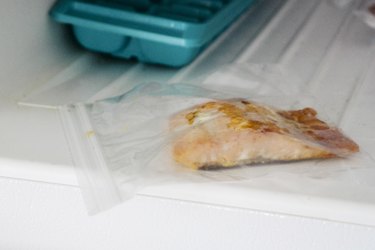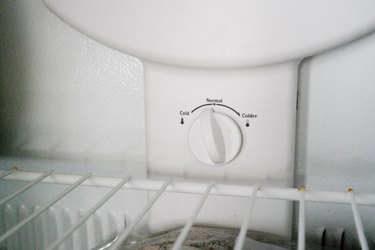
The average American consumes about 3.5 ounces of seafood per week, reports the National Oceanic and Atmospheric Administration. This is only 50 percent of the amount of fish the American Heart Association recommends healthy adults should eat weekly to lower the risk of heart disease and high blood cholesterol. Salmon is one of the best fish you can include in your diet: It's versatile, rich in omega-3 fatty acids and low in contaminants such as mercury. A simple way to increase your intake of salmon on busy days is to cook a whole fillet, divide it into serving-sized portions and freeze it to use later in the week.
Step 1

Confirm that your freezer is set at 0 degrees Fahrenheit.
Video of the Day
Step 2

Cook the salmon using a low-fat method such as baking, grilling or poaching. Allow the salmon to cool for up to two hours.
Step 3

Divide the salmon into 3.5-ounce portion sizes.
Step 4

Place the salmon portions into freezer-friendly zip-top plastic bags or airtight plastic containers. Use a pen or marker to label the bag or container with the contents and date frozen.
Things You'll Need
Fresh salmon
Zip-top plastic freezer bags or airtight plastic containers
Pen or marker
Tip
Cooked salmon can be frozen for four to six months, says the U.S. Food and Drug Administration.
Thaw cooked salmon in its freezer container in the refrigerator or immersed in cold water.
Use cooked, thawed salmon in salads or as a substitution for canned salmon in casseroles or pasta dishes.
Warning
Pregnant or nursing women, women who are planning to become pregnant and young children should have no more than 12 ounces of low-mercury fish such as salmon per week. Avoid eating salmon caught in local areas until you've spoken to local fishing advisories about the contamination levels of local fish.
Whenever possible, choose salmon farmed in the United States or wild-caught in Alaska over salmon farmed in other areas of the world, which may not be caught in an environmentally friendly manner, the Monterey Bay Aquarium's Seafood Watch advises.
Video of the Day
- NOAA Fisheries: Seafood & Human Health
- American Heart Association: Fish 101
- Monterey Bay Aquarium Seafood Watch: Salmon
- Ontario Ministry of Health and Long-Term Care: Food Safety
- Still Tasty: Food Storage - How Long Can You Keep...Salmon - Fresh, Cooked
- U.S. Food and Drug Administration: Refrigerator & Freezer Storage Chart
- U.S. Food and Drug Administration: Fresh and Frozen Seafood - Selecting and Serving it Safely